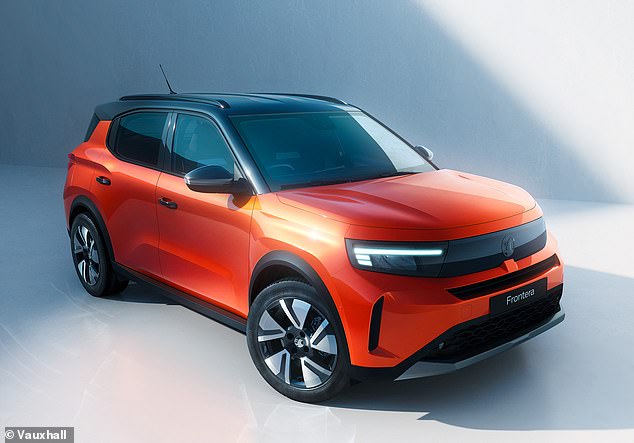Vauxhall has set out to launch the first new electric car that costs the same as its petrol alternative.
New battery and hybrid versions of the upcoming Frontera SUV will cost £23,495 when orders open in the autumn, the company said.
It is the first example on a showroom floor of electric vehicle prices falling in line with those of combustion-engine alternatives, in a sign that the zero-emissions vehicle (ZEV) mandate is forcing manufacturers to bring cheaper electric models to market.
However, Vauxhall’s UK boss has admitted that while the company has achieved price parity for customers, it is still some years away from reaching “profit parity”.
Vauxhall has confirmed prices for the new hybrid and electric versions of the Frontera SUV, and they will be the same
Vauxhall confirmed in April that it will reintroduce the Frontera name in 2024 after a 20-year hiatus.
While the brand said drivers will have the option to choose between electric or gasoline hybrid powertrains, it only announced today that both will cost the same.
The Frontera Electric is said to be the first new electric vehicle that will “eliminate the price disparity that often exists between electric and gasoline versions of the same car.”
The average premium for electric vehicles in the UK market is currently estimated to be 31 per cent.
This also means the Frontera will be one of the least expensive electric family models available in UK showrooms, undercutting rivals such as the MG4 EV by £3,500 and the Mazda MX-30 SUV by almost £4,500.
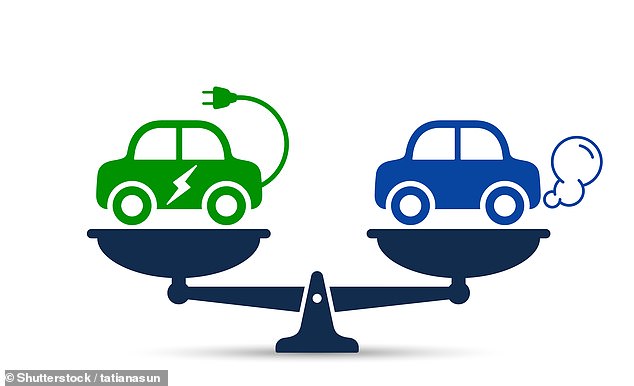
The automaker says this is the first example of price parity for a new electric vehicle with an internal combustion engine alternative.
For the entry price of £23,495, buyers can have the Frontera Electric with a 44kWh battery feeding power to a single 112bhp electric motor on the front axle.
This provides a range of 300 kilometres and a 0-100 km/h acceleration time of 12.1 seconds. It can also be charged at rates of up to 100 kW.
A more expensive Long Range version, with a larger battery and two electric motors, is due to launch next year and is said to be able to travel up to 248 miles on a full charge.
For just under £23,500, buyers could opt for the petrol hybrid version.
It is a combination of a 1.2-litre three-cylinder petrol engine with 99 hp coupled with a 48 V 28 hp electric motor in the gearbox.
For an additional £1,500, customers can upgrade to a more powerful 134bhp hybrid engine.
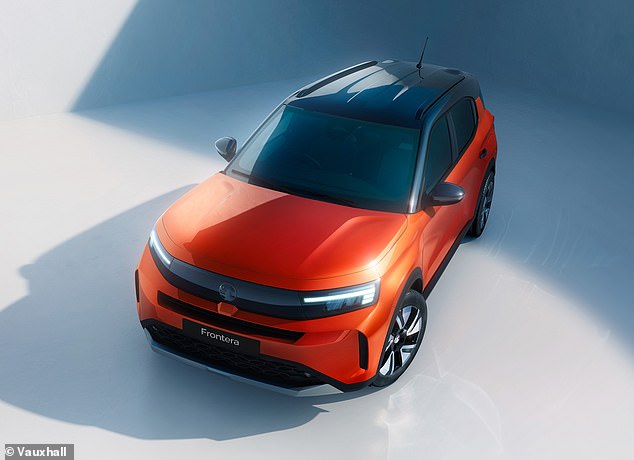
New battery and hybrid versions of the upcoming Frontera SUV will cost £23,495 when orders open in the autumn
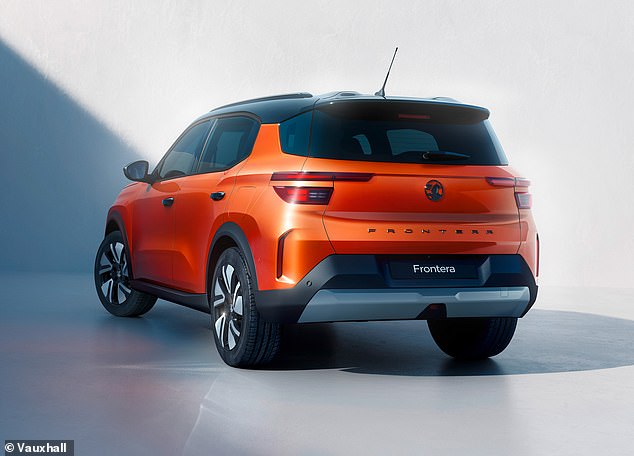
Vauxhall confirmed in April that it will reintroduce the Frontera model in 2024 after a 20-year hiatus
Sign that the ZEV mandate is forcing brands to reduce EV prices
Vauxhall’s groundbreaking price parity announcement is an important sign that binding EV sales targets set by the Government from this year are already having the desired effect.
The ZEV mandate became law in January and requires major automakers to sell an increasing share of electric vehicles each year until a ban on sales of new gasoline and diesel models expires.
By 2024, more than a fifth (22 per cent) of all models sold by major brands will need to be electric vehicles if they are to avoid financial penalties of up to £15,000 per vehicle below the threshold.
The minimum requirement for electric vehicle sales rises to 28 per cent next year and gradually grows to 80 per cent by the end of the decade – however this could soon change now that the Department for Transport has confirmed it will accelerate a ban on new combustion engine cars by five years to 2030.
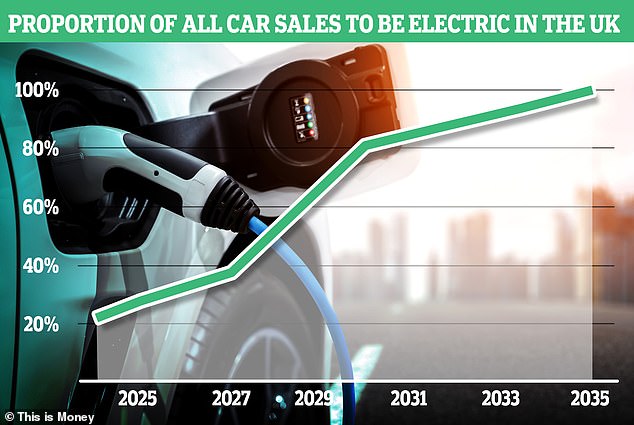
The zero-emission electric vehicle mandate requires carmakers to sell an increasing proportion of electric vehicles each year, eventually leading to a complete ban on the sale of new petrol and diesel vehicles. Ministers had hoped it would force manufacturers to expand the range of electric vehicle models available to customers, especially at the low-cost end of the market.
The mandate was put in place in an effort to force automakers to introduce a wider range of electric vehicle models to consumers, particularly cheaper options than those currently populating the market.
Ministers believe it is a better way to boost sales of electric vehicles in the run-up to the ban without the need to introduce incentives such as purchase subsidies, which would have to be supported by the taxpayer.
Vauxhall’s UK boss says it is on track to hit a 25 per cent EV sales mix this year – and that’s before factoring in the arrival of the new Frontera and larger Grandland Electric.
Managing director James Taylor told Autocar that the arrival of the two new electric SUVs should boost the share of EV sales to around 30 per cent, which is already higher than next year’s target.
However, he added that it will be “very difficult” for the company to reach the 33 percent threshold by 2026 “without a stimulus” for the electric vehicle market.
He told the automotive outlet that carmakers are doing their best to increase the availability of electric vehicles with new models, but says this will only “help a little” in meeting the binding thresholds in the short term.
Other brands, including Ford, have suggested they could restrict the number of new petrol cars delivered to Britain as part of a bid to artificially boost the share of electric vehicle sales in coming years to meet ZEV requirements.
Price parity for consumers, but not profit parity for manufacturers
The price of a new electric car will fall to the same level as that of an equivalent new petrol or diesel model “much faster than initially expected”, according to a report published earlier this year.
US market research firm Gartner has suggested that electric vehicles will be cheaper to manufacture than cars with internal combustion engines on average by 2027.
He said he expects construction costs to fall considerably faster than the cost of batteries, which are the most expensive part of an electric vehicle and account for about 40 percent of the vehicle’s price.
While Vauxhall’s Frontera prices suggest it has beaten this prediction by three years, Taylor suggests the manufacturer will take the hit by cutting prices on its electric vehicles.
When asked by Autocar, he said the company was “still several years away” from achieving comparable profits from sales of electric and petrol vehicles.
What will help drive down costs for automakers is a strong local battery supply chain, but also support to improve demand for used electric vehicles, whose residual values are currently 10 percent lower than those of combustion-engine cars on average.
“Building them at the same cost is one point, but clearly, if their value as a used car is less than that of an equivalent internal combustion engine, that is having a significant impact on our profitability,” Taylor explained.
Some links in this article may be affiliate links. If you click on them we may earn a small commission. This helps us fund This Is Money and keep it free to use. We do not write articles to promote products. We do not allow any commercial relationships to affect our editorial independence.

